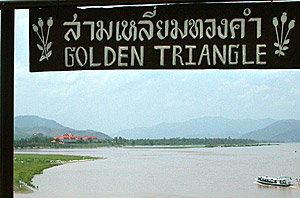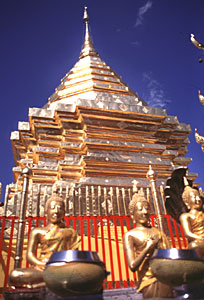Where has all the opium gone?
In the Golden Triangle, the opium warlords have turned to tourist barons, every one. Once the roost of bandits, the notorious triangle has turned respectable, complete with cappuccino stalls. But across the border in Burma, poppies are still the drug of choice
By Ron Gluckman / Golden Triangle
A
MIDDLE EASTERN BAZAAR RAGES along the roadway as the asphalt plunges deep into the infamous Golden Triangle. Once the province of tribal warlords and drug barons, the former opium-growing empire straddling the Thai-Burmese border now boasts an endless stream of Kodak and Fuji film stores, food stalls and hotels topped with satellite dishes.This was heaven to heroin junkies, until the War on Drugs produced perhaps its only victory here. "You won’t find a single opium poppy anywhere," boasts a Thai official, and he’s quite correct. The only poppies to be found in this Eden of opium fields are on Golden Triangle T shirts.
 With the drugs weeded out, a thicket of trinket shops are threatening to turn the
Golden Triangle into a giant tourist arcade. The street-side emporium by the border at Mae
Sae has it all: inflatable toys, novelty pagers and musical Mao cigarette lighters from
China, along with opium scales, bamboo baskets, drawstring hippie pants and hundreds of
kinds of handicrafts from the hill tribes of Northern Thailand.
With the drugs weeded out, a thicket of trinket shops are threatening to turn the
Golden Triangle into a giant tourist arcade. The street-side emporium by the border at Mae
Sae has it all: inflatable toys, novelty pagers and musical Mao cigarette lighters from
China, along with opium scales, bamboo baskets, drawstring hippie pants and hundreds of
kinds of handicrafts from the hill tribes of Northern Thailand.
But the real attraction in Mae Sae lies just beyond the wood sign that proclaims: "Northernmost Point in Thailand." Until recently, the sign itself was a landmark. This was as far as tourism reached. The ultimate in exotica for visitors was a snapshot in front of this sign, Burmese border guards in the background. Native girls in woven costumes and wacky headgear provided indigenous color - for a fee.
However, the forces of free enterprise are on a roll, and today the Burmese are hungry for a slice of the tourism pie. Beginning in March, tourists could pull up to the border post, plop down five dollars, American currency of course, and stroll across the bridge into one of the world’s last socialist states.
 The transition is subtle, rather than striking. One leaves the clutter of vender stands
in consumer-crazy Thailand, crosses the Sai River, and steps into ... a clutter of Burmese
street stalls.
The transition is subtle, rather than striking. One leaves the clutter of vender stands
in consumer-crazy Thailand, crosses the Sai River, and steps into ... a clutter of Burmese
street stalls.
On offer in the Burmese border town of Tachelik are tacky Top Gun and London Boy watches, soft-porn karaoke videos and vile black-label local whiskey.
Decades of isolation and increasingly bizarre rulers in Burma clearly haven’t quelled the appetite for consumer goods, only the production of them. Once Asia’s richest nation, Burma is now decades behind even China in churning out imitation Tonka trucks, fake Levis and Ninja Turtle Beach Towels.
In fact, the Pearl of Asia, as Burma was known, must make do as a middle man. Thousands of Thais pour across every day to purchase dried mushrooms, cheap cigarettes and other trinkets from China. They also find tiger paws, skulls in every size and shape, and the skins of snow leopards and other endangered species. Before a doorway ringed by "Merry Christmas" tinsel, one young Burmese lad sells keychains attached to tiny plastic-encased lizards.
Queasiness aside, any commerce is reason for celebration in cash-starved Burma, and there are signs that this is just the beginning of the border boom in Tachelik. A park opened in May, the first of what officials promise will be many tourist traps. A nine-hole golf course opened recently and bamboo scaffolding can be seen everywhere.
Residents say border life is largely free of the repression reported elsewhere in Burma. "The army has no place here," boasts one shopkeeper. "In Tachelik, we are free." As evidence, around the corner is a sign of the National League for Democracy, whose leader, Aung San Suu Kyi, still awaits the transfer of power that she won in a landslide election six years ago. Even as her supporters were rounded up again in Rangoon this month, politics and the pursuit of profits were openly on display in Tachelik.
Nor is Tachelik an isolated example. All along the Thai border, the bustle of construction and hustle of scams shows that Burma isn’t that different from the rest of the world, when it comes to the most basic human right: making a buck.
Where Laos, Thailand and Burma meet at the apex of the Golden Triangle, construction has restarted on a huge hotel-casino complex. The Burmese project began in the early 1990s, but was halted by a lack of funds and the drug battles with Khun Sa, which also closed the border at Tachelick for a year, until March.
Down river from the casino sits a fleet of new hovercraft. Locals say they cost US$1.4 million each, and were financed by Burmese drug lords, who want to switch from opium to group tours, as soon as visa rules loosen on the Mekong River between Laos and China.
Maesalong Tour just launched this cruise route. Director Tanomsak Serivichyaswad says boats can run the river except during two months of high water, but rapids are nothing compared to the years he spent wining and dining officials to gain approval for the trips. "The river is the easy part," he says wearily. "Organizing this has made me very old."
 However, government officials in Laos and Burma, the weak links between booming
southern China and northern Thailand, are growing wise to the ways of commerce. In May,
they gathered for a "quadrangle" summit and promised to relax visa restrictions
and promote cross-border trade
However, government officials in Laos and Burma, the weak links between booming
southern China and northern Thailand, are growing wise to the ways of commerce. In May,
they gathered for a "quadrangle" summit and promised to relax visa restrictions
and promote cross-border trade
How serious they are remains to be seen, but entrepreneurs are flocking to the Triangle in search of new gold. Le Meridian, the French hotel chain, operates a luxury resort at the very apex of the Golden Triangle, while the ritzy Regent recently opened an opulent boutique resort amongst rice fields and jungles outside Chiang Mai.
This has long been the stomping grounds of backpackers on trekking tours, and bandits. Now, it looks like big bucks for all.
"Burma and Laos are beckoning," says Duncan Jameson, manager of the Le Meridien Baan Boran, which overlooks both Laos and the 200-room hotel at the Burmese casino site. "Tourists are excited about the possibilities, and so are we."
Ron Gluckman is an American reporter who is based in Hong Kong, but who roams around Asia for a number of publications, such as the Wall Street Journal, which ran this story in early 1995.
To return to the opening page and index
push here
[right.htm]
